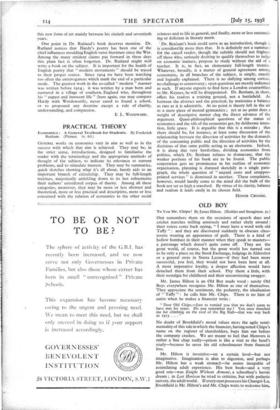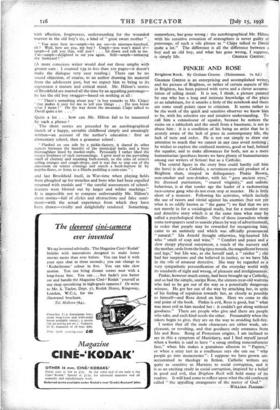OLD BOY
To You Mr. Chips ! By James Hilton. (Hodder and Stoughton. 5s.;
ONE remembers them on the occasions of speech days and cricket matches milling anxiously and rather shyly around : their voices come back saying, " I must have a word with old Taffy " : and they are discovered suddenly in obscure class- rooms wearing an appearance of guilt. There is a kind of hollow bombast in their manner when they speak to masters— a patronage which doesn't quite come off. They are the great world, of course, but the great world has turned out to be only a place on the Stock Exchange, lodgings in Aldershot or a general store in Sierra Leone—if they had been more successful, you feel, they would not have been here at all. A more imperative loyalty, a deeper affection would have detached them from their school. Pity them a little, with their nostalgia for childhood and their unconvincing swagger.
Mr. James Hilton is an Old Boy made vocal : surely Old Boys everywhere recognise Mr. Hilton as one 'of themselves. They appreciate the sentiment, the pedantry, the idealisation of " Taffy '" : he calls him Mr. Chips. There is no hint of satire when he makes a financier write :
" Dear Old Chips,—Just to remind you that we don't seem to - have met for years. Do you remember me ? You once thrashed me for climbing on the roof of the Big Hall—that was way back 1111913..."
No doubt of Brookfield's moral values mars the agile senti- mentality of this tale in which the financier, having noted Chips's name on the register of shareholders, buys him out before the company crashes. We are meant to feel that Menvers is rather a fine chap really—prison is like a visit to the head's study—because he saves his old schoolmaster from financial loss.
Mr. Hilton is inventive—on- a certain level—but not imaginative. Imagination is akin to digestion, and perhaps Mr. Hilton has a weak stomach—he seems incapable of assimilating adult experience. His best book—and a very good orie—was Knight Without Armour, a schoolboy's heroic dream ; in Lost Horizon he tried to criticise, but with pathetic naivety, the aduleworld. If everyman possesses his ChangriZLa, Brookfield is Mr. Hilton's and Mr. Chips waits to welcome him,
with affection, forgiveness, understanding for the wounded warrior in the old boy's tie, a kind of " great sweet mother "
" You were here in—umph—let me see—in nineteen-hundred, eh ? Well, how are you, my boy ? Umph—you won't mind if- umph—I call you that, will you ? . . . Sit down and talk to me. I'm—umph—delighted to see you again. Still—umph—imitating the farmyard ? "
(A more conscious writer would deal out those umphs with greater care : I counted 539 in less than too pages—it doesn't
make the dialogue very easy reading.) There can be no sound objection, of course, to an author drawing his material from the adolescent past, but we expect him to bring to its • expression a mature and critical mind. Mr. Hilton's stories of Brookfield are marred all the time by an appalling patronage— he has the old boy swagger—based on nothing at all :
" ' There's something about you ' (a boy remarks to Mr. Chips) ' that makes it easy for me to tell you things . . . Do you know what I mean ? ' On the way down the mountain Chips talked to David quite a lot . . . "
.Quite a lot . . . how can Mr. Hilton fail to be nauseated by such a phrase ?
The short stories are preceded by an autobiographical sketch of a happy, enviable childhood simply and amusingly written—an account of the author's education : first an elementary school, then a grammar school :
" Flanked on one side by a pickle-factory, it shared its other aspects between the laundry of the municipal baths and a busy thoroughfare lined by market-stalls. - Personally I rather liked the rococo liveliness of such surroundings. I grew used to the pervading smell of chutney and steaming bath-towels, to the cries of costers selling oranges and cough-drops, and it was fun to step out of the classroom on winter evenings and search a book-barrow lit by naptha-fiares, or listen to a Hindu peddling a corn-cure " :
and last Brookfield itself, in War-time when playing fields
were ploughed up for trenches and boys who had been expelled returned with medals and " the careful assessments of school- masters were blotted out by larger and wilder markings." It is impossible not to compare unfavourably Mr. Hilton's short stories—full of cliches and abstractions and false send- apent—with the actual experience from which they 'have been drawn—vividly and delightfully rendered. • Something, somewhere; has-gone wrong : the autobiographical Mr. Hilton with his sensitive evocation of atmosphere is never guilty of patronage, of such a vile phrase as " Chips talked to David quite a lot." The difference is all the difference between a boy and an old boy, and what has gone wrong, I suppose,











































 Previous page
Previous page